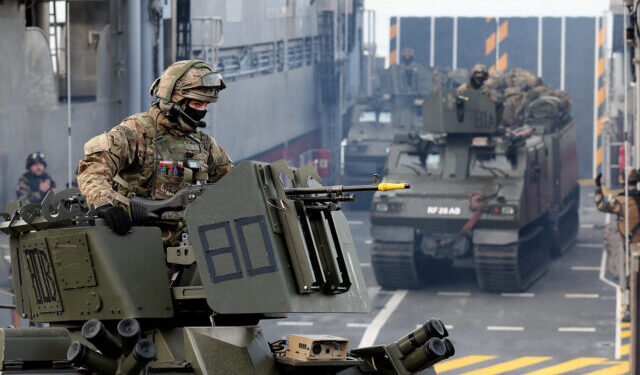Hours before President Donald Trump sits down with Vladimir Putin in Alaska for what could become a defining moment in the Ukraine war, Britain made a startling announcement. The United Kingdom is openly preparing to put troops into Ukraine the moment a ceasefire is declared.
Defence minister John Healey, speaking to the BBC, left little doubt about the seriousness of the move. “In the circumstances of a ceasefire we’re ready to put UK boots on the ground in Ukraine… They are ready to go, they’re ready to act from day one,” he said. While brushing off questions about British troops coming under Russian fire as “hypothetical,” Healey added, “any British forces have the right to defend themselves if attacked.”
The justification, according to Healey, is that reinforcing Ukraine’s forces and helping them rearm would serve as “strongest deterrence against Russia reinvading.” He also expressed hope that the Trump-Putin summit would serve as “a first step towards serious negotiations” and emphasized that “the end to war must come through talking, must come from diplomacy.”
This comes as President Trump has positioned himself at the center of international negotiations. He has indicated that while today’s bilateral talks with Putin are significant, the real breakthrough may come with a second meeting involving Ukrainian President Volodymyr Zelensky. Trump has stressed that persuading Putin to sit across the table from Zelensky is the key hurdle ahead.
The UK and France recently created a joint military headquarters for their so-called Coalition of the Willing. It is headquartered in France for now and will rotate to London next year. Plans include setting up a coordination cell in Kyiv led by a British general if the deployment occurs. Downing Street says the mission’s ambitions include rebuilding Ukraine’s ground forces, securing its skies through “Air Policing,” and patrolling the Black Sea.
Despite claims of broad global support, the coalition’s foundation is still thin. While Germany and Poland have edged closer to backing the effort, Berlin has shown marked hesitation, questioning whether boots on the ground is the right path. This leaves the Anglo-French group carrying the bulk of responsibility at a time when European publics remain divided over deeper involvement in the war.
The United States, wary of being drawn into a direct confrontation with Russia, has been careful. President Trump said he might offer security guarantees to the force, but “not in the form of NATO.” Speaking mid-flight to Alaska, Trump struck a blunt note, warning Putin that if the Russian leader approached talks in bad faith, there would be consequences. “Economically severe. Yes, it will be very severe. I’m not doing this for my health, okay… I don’t need it. I’d like to focus on our country, but I’m doing this to save a lot of lives. Yeah, very severe.”
For conservatives, this raises critical questions. While Britain’s Labour-led government signals readiness to commit troops, Americans know all too well the dangers of open-ended commitments abroad. Talk of “peacekeeping” often morphs into years-long entanglements, funded by taxpayers and managed by distant bureaucracies. Europe has a long history of leaning on U.S. leadership and military might, yet in this case, Washington is making clear it will not underwrite the mission under NATO’s umbrella. That’s a significant departure from decades of precedent.
What’s unfolding now underscores both the potential and the peril of Trump’s peace push. If he succeeds, he will have pulled off what many thought impossible: forcing Moscow and Kyiv toward an agreement without endless wars of attrition. But if Europe rushes in with troops while the ceasefire is still fragile, the West risks creating yet another quagmire — one that puts soldiers in harm’s way with no clear exit plan.
The Alaska summit will set the tone. Trump has made it clear his aim is peace through strength, backed by economic leverage rather than blind escalation. Whether Britain’s eagerness to “act from day one” aligns with that strategy — or creates new risks — may become clear in the hours ahead.





















Not for one moment do I believe that Zelensky and the EU are prepared to do this! Zelensky played games with that “I’m ready to talk” and then started making demands! This is what Biden said doesn’t cut it with Trump! Even today it’s “I’m not giving up any land” without any negotiations on boundaries. The EU just said it themselves saying Russia wants to regain its territory, yes..regain!! They said that they weren’t going to support Ukraine until they get the support from the US, which means they can’t afford to be in this at all! They never were,it was all Biden using our money!!
ремонт проточных водонагревателей [url=http://www.master-remonta-boylerov.ru/]http://www.master-remonta-boylerov.ru/[/url]